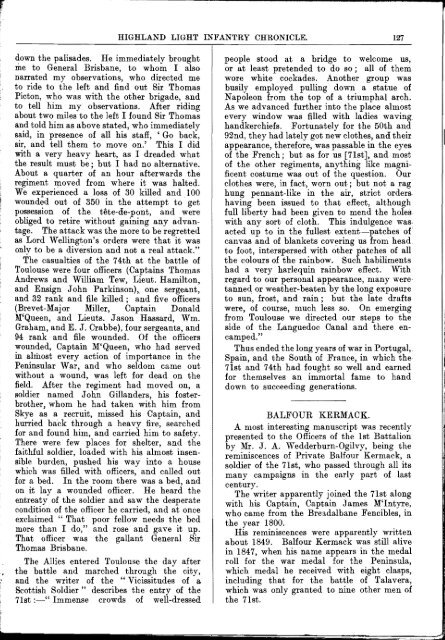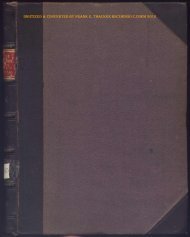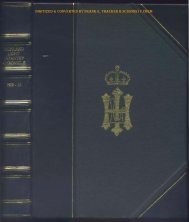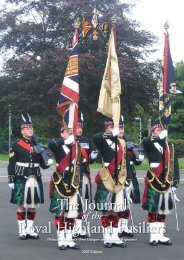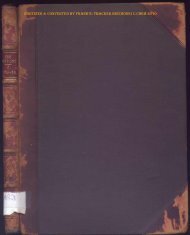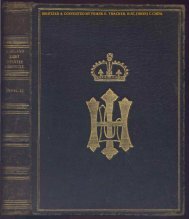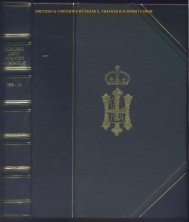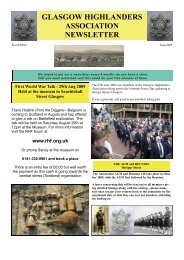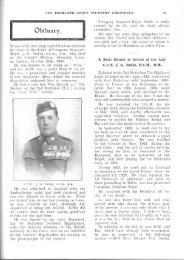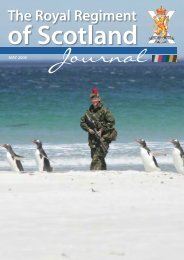HIGHLAND LIGHT INFANTRY CHRONICLE. 127down the palisades. He immediately broughtme to General Brisbane, to whom I alsonarrated my observations, who directed meto ride to the left and find out Sir ThomasPicton, who was with the other brigade, andto tell him my observations, After ridingabout two miles to the left I found Sir Thomasand told him as above stated, who immediatelysaid, in presence of all his staff, 'Go back,sir, and tell them to move on: This I didwith a very heavy heart, as I dreaded whatthe result must be; but I had no alternative.About a quarter of an hour afterwards theregiment moved from where it was halted.We experienced a loss of 30 killed and 100wounded out of 350 in the attempt to getpossession of the tete-de-pont, and wereobliged to retire without gaining any advantage.<strong>The</strong> attack was the more to be regrettedas Lord Wellington'S orders were that it wasonly to be a diversion and not a real attack."<strong>The</strong> casualties of the 74th at the battle ofToulouse were four officers (Captains ThomasAndrews and William Tew, Lieut. Hamilton,and Ensign John Parkinson), one sergeant,and 32 rank and file killed; and five officers(Brevet-Major Miller, Captain DonaldM'Queen, and Lieuts. Jason Hassard, Wm.Graham, and E. J. Crabbe), four sergeants, and94 rank and file wounded. Of the officerswounded, Captain M'Queen, who had servedin almost every action of importance in thePeninsular War, and who seldom came outwithout a wound, was left for dead on thefield. After the regiment had moved on, asoldier named John Gillanders, his fosterbrother,whom he had taken with him fromSkye as a recruit, missed his Captain, andhuxried back through a heavy fire, searchedfor and found him, and carried him to safety.<strong>The</strong>re were few places for shelter, and thefaithful soldier, loaded with his almost insensibleburden, pushed his way into a housewhich was filled with officers, and called outfor a bed. In the room there was a bed, andon it lay a wounded officer. He heard theentreaty of the soldier and saw the desperatecondition of the officer he carried, and at onceexclaimed "That poor fellow needs the bedmore than I do," and rose and gave it up.That officer was the gallant General SirThomas Brisbane.<strong>The</strong> Allies entered Toulouse the day afterthe battle and marched through the city,and the writer of the "Vicissitudes of aScottish Soldier" describes the entry of the7lst :-" Immense crowds of well-dressedpeople stood at a bridge to welcome us,or at least pretended to do so; all of themwore white cockades. Another group wasbusily employed pulling down a statue ofNapoleon from the top of a triumphal arch.As we advanced further into the place almostevery window was filled with ladies wavinghandkerchiefs. Fortunately for the 50th and92nd, they had lately got new clothes, and theirappearance, therefore, was passable in the eyesof the French; but as for us [71st J, and mostof the other regiments, anything like magnificentcostume was out of the question. Ourclothes were, in fact, worn out; but not a raghung pennant-like in the air, strict orders.having been issued to that effect, althoughfull liberty had been given to mend the holeswith any sort of cloth. This indulgence was,acted up to in the fullest extent-patches ofcanvas and of blankets covering us from headto foot, interspersed with other patches of allthe colours of the rainbow. Such habilimentshad a very harlequin rainbow effect. Withregard to our personal appearance, many were'tanned or weather-beaten by the long exposureto sun, frost, and rain; but the late draftswere, of course, much less so. On emergingfrom Toulouse we directed our steps to theside of the Languedoc Canal and there encamped."Thus ended the long years of war in Portugal,.Spain, and the South of France, in which the71st and 74th had fought so well and earnedfor themselves an immortal fame to handdown to succeeding generations,BAI.FOUR KERMACK.A most interesting manuscript was recentlypresented to the Officers of the 1st Battalionby ~Ir. J. A. Wedderburn-Ogilvy, being thereminiscences of Private Balfour Kermack, asoldier of the 7lst, who passed through all itsmany campaigns in the early part of lastcentury.<strong>The</strong> "''Titer apparently joined the 7lst alongwith his Captain, Captain James M'Intyre,who came from the Breadalbane Fencibles, intheyear 1800.His reminiscences were apparently writtenabout 1849. Balfour Kermack was still alivein 1847, when his name appears in the medalroll for the war medal for the Peninsula,which medal he received with eight clasps,including that for the battle of Talavera,which was only granted to nine other men ofthe 71st.
I ' ..~,128 HIGHLAND LIGHT INFANTRY 'CHRONICLE.A SHORT SKETCH OF THE CAMPAIGNS OF BALFOUR KJiJRMACK, 7lST REGIMEN'rHIGHLANDERS (LIGHT INFANTRY), FROM 1806 TILL 1814. -~-(WITH NOTES APPENDED POINTING OUT THE DANGERS AND PR.IVATIONS INCIDENT TO A MILITARY LIFE.),----~-~~-~~---~--~-----~-~-~~~----------.----------.-~-~.,-~.~---::;r0.NAMES OF BATTLES.WHERE FOUGHT.DATES.REFERENCES TO ::;rOTES,ETC.1 Cape of Good Hope~ Buenos Ayres3 Roleia4 Vimeiro5 Oporto6 Talavera de la Regna7 Fuentos de Honor8 Arroya de Molino9 Almarez10 Alba de Tormes11 Vittoria12 Puerto Maya13 Puerto Maya14 Pyrenees15 Pyrenees16 Pyrenees17 Pyrenees18 Passage of the Nive19 Passage of the Nive20 Saint SeverJH Saint Sever:12 Saint Sever:13 Orthes24 Aire25 ToulouseAfricaSouth AmericaPortugalPortugalPortugalSpainSpainSpainSpainSpainSpainSpain (Pyrenees)Spain (Pyrenees)SpainSpainSpainSpainFranceFranceFranceFranceFranceFranceFranceFrance6th Jan., 1806 See Note A.24th June, 1806BJ <strong>The</strong> " Regiment only17th Aug., 1807l partially engaged.!Hst Aug., 1807 See Note C9th May, 1809D!l8th July, 1809 " E3rd May, 1811 " F"JWe destroyed the~8th Oct., 1811 I enemy, took 5 gunsand 500 prisoners.19th May, 1812 See Note G10-11th Nov., 1812H~lst June, 1813 " I4th July, 1813 "8th July, 181325th July, 181330th .July, 1813K}"1st Aug., 18131st Dec., 1813{Wh,n driving th,enemy from the9th Dec., 1813 village of Cambo I13th Dec., 1813lost my Captain14th Feb., 181415th Feb., 181417th Feb., 181425th Feb., 1814!lnd Mar., 1814lOth April, 1814Taken prIsoner 11th Aug., 1806.by a cannon shot.( None of these actions"severe. <strong>The</strong>y con1 sisted chiefly inskirmishing.See Note LM" N"As it is the avowed design of the writer of shall state what passed within my own obserthefollowing notes only to point out the vation, and give a few anecdotes which maydangers and privations incident to a military in some measure amuse the reader.life, a fnU description of the battles in which A. <strong>The</strong> capture of the Oape of Good Hopehe was engaged cannot be expected. A was the fIrst of my active service, and it wassoldier in his ranks cannot describe a battle; accomplished with very little hardship tohe only knows what takes place in the Com the soldier. We suffered no privations.pany to which he belongs, or those on his Everything was as comfortable as circumrightand left. He cannot describe the move stances would admit. I state an anecdotements of the army; being confined to close or two among many that came within my ownranks his views only extend to his own front, observation. On the evening before theto which he is compelled to look. Such, then, battle we were seated in small parties talking .heing the case with the private soldier, I a.bout the work of to-morrow, some making
- Page 1 and 2:
digitized & converted by frank e. t
- Page 3:
2 HIGHLAND LIGHT INFANTRY CHRONICLE
- Page 9 and 10:
Octobm at Ambala it was qlliu kly l
- Page 11 and 12:
10 HH;J[L A NT therillg to tn ke pl
- Page 13 and 14:
12 HIGJI~AND LIG):J;T INFANTRY CHRO
- Page 15 and 16:
14 HIGHLAND LIGH'I INFANTRY CHRONIC
- Page 17 and 18:
HiL~FAN TR YCIl R NICLE.SIIoW Lie u
- Page 19 and 20:
18 HIGHLAND LWHT INFANTltY CHRONICL
- Page 21 and 22:
20 HIGHLAND LIGHT INFANTRY CHRONICL
- Page 23 and 24:
22 HIGHLAND LIGHT INFANTRY CHRONICL
- Page 25 and 26:
24 IlIGHLAND LIGHT INFANTRY CHRONIC
- Page 27 and 28:
the match between the above teams i
- Page 29 and 30:
:28 HIGHLAXD LIGHT IXJ;'AN'J:RY CHR
- Page 31 and 32:
30 HIGHLAND LIGHT INl!'ANTRY CHRONI
- Page 33 and 34:
HIGH LA ND LIGHT INFANTRY CHRONICLE
- Page 35 and 36:
HIGHLAND LlGHT INFANTRY CHRONICLE.A
- Page 37 and 38:
HIGltLAND LlltHf INFANTRY CHRONICLE
- Page 39 and 40:
38HIGHLAND LIGHT IN}'ANTRY CHRONICL
- Page 41 and 42:
41) HIGHLAND LIGHT INFANTRY CHRONIC
- Page 43 and 44:
HIGHLAND LIGHT INFANTRY CH RONT ' L
- Page 45 and 46:
HIGHLAND LIGHT INFANTRY CHRONICLE.S
- Page 47 and 48:
46 HIGHLAND LIGHT INFANTRY CHRONICl
- Page 49 and 50:
48HIGHLAND LIGHT INFANTRY CHRONICLE
- Page 51 and 52:
50 HIGHLAND LIGHT INFANTRY CHRONICL
- Page 53 and 54:
52 HIGHI.AND LIGHT INFANTRY CHRONIC
- Page 55 and 56:
HIGHLAND LIGH1' INFANTRY CHRONICLE.
- Page 57 and 58:
56 HIGHLAND LIGHT INFANTRY CHRONICL
- Page 59 and 60:
58 HIGHLAND LIGHT INFANTRY CHRONICL
- Page 61 and 62:
60 IIIGnLA.. D LIGHT INFA.NTRY CHRO
- Page 63 and 64:
62The Hi~ hlalld Brigade Dinll(' r
- Page 65 and 66:
--------evening's enjoyment was rea
- Page 67 and 68:
66 HIGHLAND LIGHT INFANTRY CHRONICL
- Page 69 and 70:
68 HIGHLAND LIGHT INFAN'rRY CHRONIC
- Page 71 and 72:
iJald .lluna v , wllo ha s jll ·t
- Page 73 and 74:
·72 HIGHLAND LIGHT INFANTRY CHJlO~
- Page 75 and 76:
74 HIGHLAND LTGHTI~FANTRY CHllQNICL
- Page 77 and 78: 76 HIGHLAND LIGHT INFANTRY CHRONICL
- Page 79 and 80: --~.-,.~.78 HIGHLAND LIGHTHIGHLAND
- Page 81 and 82: 'llis IOIl ~ ~f' rVi (: l' ~\rl', }
- Page 83 and 84: llWHLAl'D T,IU HT INFANTRY ClIH,()
- Page 85 and 86: 84 HJGHLAND LIGHT INFANTRY CHIWNICL
- Page 87 and 88: 86 HIGHLAND LWHT INFANTRY CHRONICLE
- Page 89 and 90: 88 HIGHLAND LIGHT INFANTRY CHRONICL
- Page 91 and 92: {j() HlHILL \ D LWHT r~l
- Page 93 and 94: 92 HIGHLAND LIGHT INFANTRY CHRONICL
- Page 95 and 96: 94 HIGHLAND LIGHT INFANTRY CHRONICL
- Page 97 and 98: 96HIGHLAND LIGHT INFANTRY CHRONICLE
- Page 99 and 100: 98 HIGHLAND LIGHT INFANTRY CHRONICL
- Page 101 and 102: 100 HIGHLAND LIGHT INFANTRY CHRONIC
- Page 103 and 104: 102 HIGHLAND LIGHT INFANTRY CHRONIC
- Page 105 and 106: HIGHLAND LIGHT INFANTRY CHRONICLE.-
- Page 107 and 108: 106 HIGHLAND LIGHT INFANTRY CHRONIC
- Page 109 and 110: ----------------------108 HIGHLAN
- Page 111 and 112: 2nd Battalion News."EDITOR S NOTES.
- Page 113 and 114: 112 HWHLAND LIGHT INFANTRY CHRONICL
- Page 115 and 116: 114(Jorrn YIl), I; " ])" Co),., 2 ;
- Page 117 and 118: '116 HIGHLAND LIGHT INFANTRY CHRONI
- Page 119 and 120: llX12297 Buy H. ;\1:Loughlin, 2 'Lh
- Page 121 and 122: 120 HIGHLAND LIGH1.'~--. --_._-_._.
- Page 123 and 124: 122 HIGHLAND LIGHT INFANTRY CHRONIC
- Page 125 and 126: 124 HIGHLAND LIGHT INFANTRY CHRONIC
- Page 127: 12£ HIGHLAND LIGHT INFANTRY CHRONI
- Page 131 and 132: 130 HIGHLAND LIGHT INFAN'l'RY CHRON
- Page 133 and 134: HIGULAND LIGHT INFANTRY CHRONICLE .
- Page 135 and 136: HIGHLAND LIGH'l' INFANTRY CHRONICLE
- Page 137 and 138: 136 HIGHLAND LIGHT INFANTRY CHRONIC
- Page 139 and 140: 138 HIGHLAND LIGHT INFANTRY CHRONIC
- Page 141 and 142: 140 HIGHLAND LIGHT INFANTRY CHRONIC
- Page 143 and 144: 142 lllGHLA.KD LIGHT INFANTRY CHRON
- Page 145 and 146: HIGHLAND LIGHT INFANTRY CHRONICLE.m
- Page 147 and 148: HIGHLAND 'LIGllT INFANTRY CHRONICLE
- Page 149 and 150: z0
- Page 151 and 152: 148 HIGHLAND LIGHT INFANTRY CHRONIC
- Page 153 and 154: HIGHLAND LIGHT INFANTRY CHRONWLE.14
- Page 155 and 156: 21'D L1 GU't . H. n. Ir. KJ, fTl "K
- Page 157 and 158: 152 HIGHLAND LIGHT INFANTRY CHRONIC
- Page 159 and 160: 154 HIGHLAND LIGHT INFANTRY CHRONIC
- Page 161 and 162: 156 HIGHLAND LIGHT INFANTRY CHRONIC
- Page 163 and 164: 158 HIGHLAND LIGHT INl
- Page 165 and 166: 160 HIGHLAND LIGHT INFANTRY CHRONIC
- Page 167 and 168: 162 HIGHLAND UUHTINFANTRY CIlRONICL
- Page 169 and 170: 164 HIGHLAND LIGHT INFANTRY CHRONIC
- Page 171 and 172: 166 HIGHLAND LIGHT 1~l." It so happ
- Page 173: HI8HIGHLAND LIGHT INFANTRY CHRONICL


